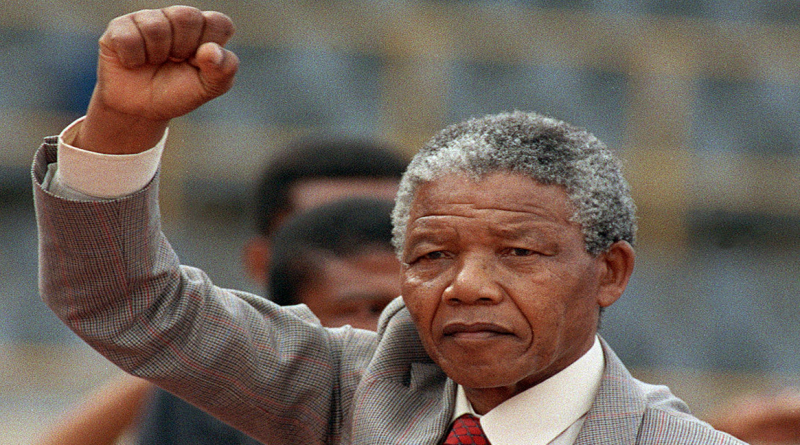President Nelson Madiba Mandela
I learned that courage was not the absence of fear,but the triumph over it. The brave man is not he who does not feel afraid,but he who conquers that fear.
President Nelson Madiba Mandela
The Power that Leaders of Groups Possess
As soon as a certain number of living beings are gathered together, whether they are animals or men, they place themselves instinctively under the authority of a chief. In the case of humans, the chief is often nothing more than a centerpiece. His will is the nucleus around which the opinions of the group are collected and attain to identity. He constitutes the first element towards the organization of heterogeneous groups which directs. A group is a chaotic flock that is incapable of ever doing without a leader.
The leaders we speak of are more frequently men of action than thinkers. They are not gifted with keen foresight, nor could they be, as this quality generally conduces to doubt and inactivity. The intensity of their faith gives great power of suggestion to their words. The multitude is always ready to listen to the strong-willed man, who knows how to impose himself upon it. They’re led by power. Men gathered in a crowd lose all force of will and turn instinctively to the person who possesses the quality they lack.
The arousing of faith whether religious, political, or social, whether faith in a work, in a person, or an idea, has always been the function of the great leaders of groups, and it is on this account that their influence is always very great. Of all the forces at the disposal of humanity, faith has always been one of the most tremendous, and it the power of moving mountains. To endow a man with faith is to multiply his strength tenfold. It’s not by the aid of the learned but of strong leaders that build great movements.
Prestige in reality is a sort of domination exercised on our mind by an individual, a work, or an idea. This domination entirely paralyses our critical faculty, and fills our soul with astonishment and respect. The sentiment provoked is inexplicable, like all sentiments, but it would appear to be of the same kind as the fascination to which a magnetized person is subjected. Prestige is the mainspring of all authority. Neither gods, nor kings, nor women have ever reigned without it. Rulers require majesty to rule.
In a parliamentary assembly the success of a speech depends almost solely on the prestige possessed by the speaker, and not at all on the arguments he brings forward. The best proof of this is that when for one cause or another a speaker loses his prestige, he loses simultaneously all his influence, that is, his power of influencing votes at will. When an unknown speaker comes forward with a speech containing good arguments, but only arguments, the chances are that he will only obtain a hearing.
When a person without prestige speaks before a group he is at once surprised at the restlessness of the people, and a little annoyed by the noise that is being made. “How is it silence is not kept? Why this general inattention? What are those people thinking about who are engaged in conversation? What urgent motive has induced this or that person to quit his seat?” An expression of uneasiness crosses his face; he frowns and stops. He decides to continue and so he begins talking again a little louder.
He is only listened to all the less. He lends emphasis to his words, and gesticulates: the noise around him increases. He can no longer hear himself, and again stops; finally, afraid that his silence may provoke the dreaded cry, `The Closure!’ he starts off again. The clamor becomes unbearable. This is such a scenario you may be familiar with when you try to speak to a group using reason and sound arguments, but not possessing enough prestige with them. Building prestige is needed to influence groups.
Acquired or artificial prestige is much the most common. The mere fact that an individual occupies a certain position, possesses a certain fortune, or bears certain titles, endows him with prestige, however slight his own personal worth. Judges have the necessity of robes and wigs. Without them they would be stripped of half their authority. The most unbending socialist is always somewhat impressed by the sight of a prince; and the assumption of such titles makes the robbing the commoner an easy matter.
Prestige lost by lack of success disappears in a brief space of time. It can also be worn away, but more slowly by being subjected to discussion. This second method, however, is exceedingly sure. From the moment prestige is called in question it ceases to be prestige. The gods and men who have kept their prestige for long have never tolerated discussion. For the crowd to admire, it must be kept at a distance. That’s why only the conscious elite are allowed into the space closest to the gods or leaders.
A crowd would at once lose its character of a crowd were it to credit its leaders with their services, whether of a party nature or rendered their country. The crowd that obeys a leader is under the influence of his prestige, and its submission is not dictated by any sentiment of interest or gratitude. In consequence the leader endowed with sufficient prestige wields almost absolute power. A person is loved not for what they have done, but for what they are. What they are is prestige and prestige is the power.
On occasion, the leader may be intelligent and highly educated, but the possession of these qualities does him, as a rule, more harm than good. By showing how complex things are, have having much elaboration, it blunts, in a large measure, that intensity and violence of conviction needful for masses. The great leaders of masses of all ages have been of lamentably narrow intellect; while it is precisely those whose intelligence have been the most restricted that have exercised the greatest influence.




